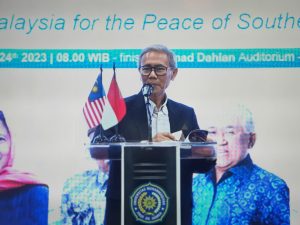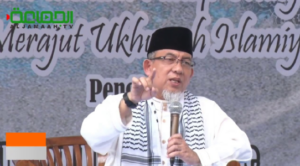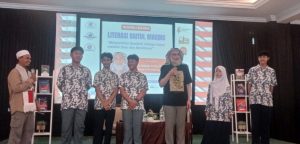By Heri Budianto, Head of LPPM STISA Abdullah Bin Mas’ud, Lampung
Since the establishment of the colonial state of Israel in 1948, the Palestinian people have been striving to establish an independent state. However, this struggle has often been hindered by internal conflicts among various political and military factions within Palestine. The two largest factions, Fatah and Hamas, have long been at odds, compounded by the emergence of new factions that have caused fragmentation and weakness in the Palestinian national movement.
The reconciliation between Palestinian factions facilitated by China in Beijing on the morning of July 23, 2024, marks a new era in the long struggle of the Palestinian people for independence and peace. After years of being divided by internal conflicts, the opportunity to reunite offers hope for a more stable and robust future. However, this reconciliation will only succeed if supported by a strong unity ideology.
Ideology of Unity
Also Read: Egypt, Qatar Deliver Trump’s Gaza Ceasefire Proposal to Hamas
The internal conflicts among Palestinian factions, especially between Fatah and Hamas, have weakened their position in the national struggle. This division has been exploited by those opposed to Palestinian independence, exacerbating the political and security situation in the region. A unity ideology will help these factions align their goals and strategies, strengthen national solidarity, and address external challenges more effectively.
Internal division has led to prolonged political and social instability in Palestine. With a solid unity ideology, Palestinian factions can collaborate to create a more inclusive and representative government. This will not only enhance internal stability but also strengthen public trust in the existing government.
Referring to the principles of good governance according to UNDP, including Participation where the public has equal voting rights, Consensus-oriented government acting as a mediator among differing interests, and Fairness providing equal opportunities to all groups, religions, and genders, is crucial. No more sectoral ego; nationalism should be prioritized over factional or group interests.
In international diplomacy, unity and stability are key factors determining how far a country or political entity can gain support. A unity ideology will demonstrate to the international community that Palestine is a stable and united entity, ready to negotiate and achieve sustainable peace. Strong international support is crucial in Palestine’s struggle for recognition and achieving their national goals.
Also Read: Israeli Airstrikes Kill 54 Palestinians Across Gaza
Building a unity ideology is not an easy task. Ideological differences, political interests, and a long history of internal conflict pose significant challenges. However, the reconciliation in Beijing provides a strong foundation to start this process. Faction leaders must show a sincere commitment to unity and cooperation for the future of Palestine.
It is also essential to involve civil society and various community elements in this process. Support from the Palestinian people is crucial to ensure the sustainability of the unity ideology. Education, dialogue, and inter-community cooperation can be effective tools to strengthen the sense of unity and solidarity among the Palestinian people.
Indonesia as a Model
United Nations Secretary-General Antonio Guterres praised Indonesia’s motto “Unity in Diversity.” He acknowledged that this motto could serve as a unifying force and protector of diversity in Southeast Asia and even the world. This praise was given during his remarks at the 43rd ASEAN Summit in Jakarta on Thursday, September 7, 2023.
Also Read: School Bus Explosion in Pakistan Kills Five, Military Accuses India
Indonesia’s unity ideology can be a model for addressing internal divisions among the Palestinian people. Sociologically, Palestinian society shares similarities with Indonesia, including the coexistence of various religions and beliefs.
Moreover, Indonesia’s diversity in ethnicities and cultures is more extensive and complex compared to Palestine. Indonesia has approximately 1,340 ethnic groups spread across 17,000 islands. Each ethnic group has its own distinct characteristics in social aspects, cultural traditions, kinship systems, and regional arts. This diversity in Indonesia is meant to strengthen unity, not divide.
This aligns with Surah Al-Hujurat, verse 13: “O mankind, indeed We have created you from male and female and made you peoples and tribes that you may know one another.”
Reconciliation among factions is a crucial first step towards achieving unity in Palestine post “Beijing Declaration.” However, to ensure the long-term success of this reconciliation, a strong unity ideology is required.
Also Read: Half a Million People in Gaza on the Risk of Starvation: IPC
Awareness of diversity, supported by the faction leaders’ willingness to set aside their egos, should help sustain the unity that has been achieved.
This ideology will not only strengthen Palestine’s position in the national struggle and international diplomacy but also create the much-needed internal stability. With sincere commitment and cooperation from all parties, the hope for a better future for Palestine can become a reality. Let’s hope for it! (T/RE1/P2)
Mi’raj News Agency (MINA)
Also Read: Israeli Captive Says “Only a Deal Will Bring Us Home”










![Israeli tanks and APC’s gather by the Israeli – Lebanese border. Amid Israel’s escalating campaign against Hezbollah in Lebanon on September 30, 2024. [Erik Marmor/Getty Images]](https://en.minanews.net/wp-content/uploads/2024/10/IMG_20241001_203226-300x197.jpg)


















 Mina Indonesia
Mina Indonesia Mina Arabic
Mina Arabic